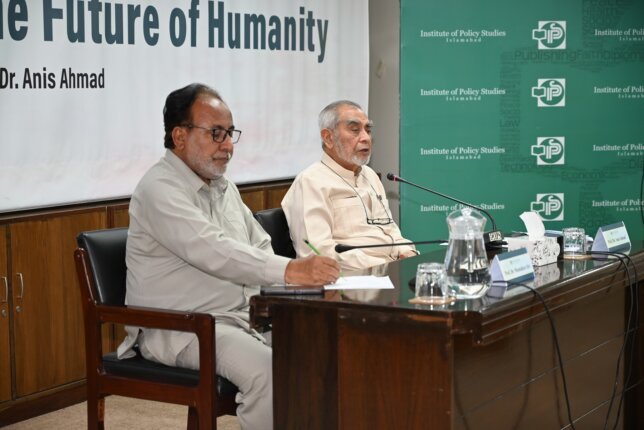Islamabad, September 2: History and civilization must be reexamined beyond Eurocentric frameworks that sideline ethics and divine guidance, argued Prof. Dr. Anis Ahmad, vice chancellor of Riphah International University, in a lecture at the Institute of Policy Studies (IPS), Islamabad.
Delivering a talk titled “Understanding History and Civilization the Right Way” as part of IPS’s ongoing series “The World Today and the Future of Humanity,” Dr. Ahmad said Western historical thought—from Greek rationalism and medieval Christian theology to Enlightenment materialism and postmodern relativism—gradually pushed ethics and divine principles to the margins. The result, he explained, was a fragmented worldview that separated the sacred from the secular and defined progress largely in material terms.
By contrast, he highlighted the Qur’anic perspective, which treats history as an ethical and moral process shaped by universal principles such as justice, fairness, honesty, and social responsibility. “The rise and fall of nations,” he noted, “is not determined by military or economic power alone, but by adherence to universal ethical values.”
Opening the session, Dr. Mustafeez Ahmad Alvi, an academic specializing in Islamic socio-political thought, emphasized how Eurocentric frameworks continue to shape contemporary global responses in ways that often overlook humanity’s long-term needs.
Dr. Ahmad elaborated that culture represents the ethical foundation of human life, while civilization is its practical manifestation in institutions, economies, and social systems. He described Islamic civilization as a universal value-based system rather than the legacy of any single region or people. “Principles such as tawhid (unity of God), adl (justice), and akhlaq (moral conduct) are not Muslim-specific; they are universal principles that can ensure dignity and sustainable progress for all societies,” he stressed.
The lecture also touched on modern challenges including distorted historical narratives, the ethical void in politics and economics, and the crisis of education. Dr. Ahmad urged Muslims to move beyond ritualistic or literalist understandings of religion, and instead reclaim Islam’s comprehensive approach, which integrates faith with reason, morality, and social responsibility.
Responding to an audience question on whether the Islamic perspective of history is theological rather than scientific, he clarified that the Qur’anic approach is rational and verifiable. “Islamic history,” he said, “is not the history of miracles or myths, but of human choices, responsibilities, and consequences.”
The hybrid session drew an international audience of scholars, educationists, and students, reflecting the global resonance of the themes discussed.



